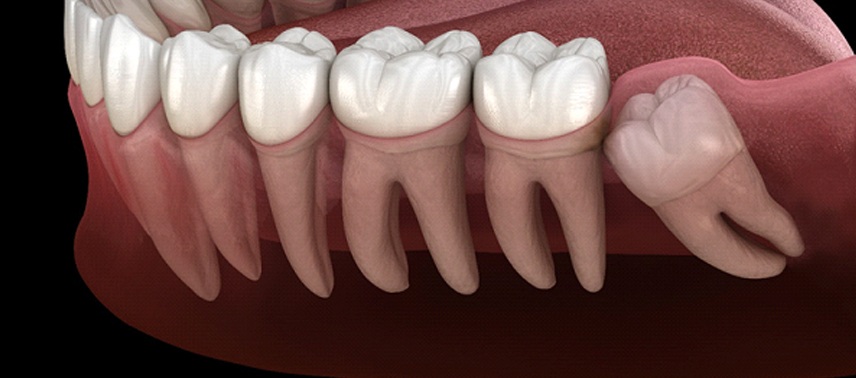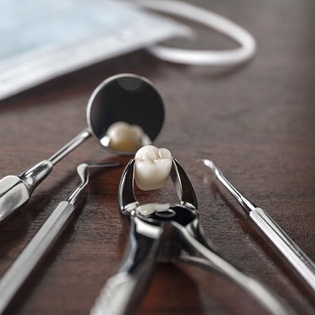Tooth Extractions – Tappan, NY
Gentle & Safe Tooth Extractions
Our primary goal with every patient is to help them keep and maintain their natural teeth for as long as possible, but in certain situations, a tooth may simply be too damaged to be repaired, in which case it should be extracted. We know tooth extractions in Tappan can cause patients of all ages to feel nervous, but we promise to make it a painless process thanks to the techniques and technology we use. Plus, with the help of sedation dentistry, we can even help calm those pre-treatment nerves, so a patient can feel completely relaxed the entire time. Contact us today to learn more about this procedure and how we can help you.

Why Choose Smile More Dentistry for Tooth Extractions?
- Same-Day Appointments Available for Patients in Pain
- Sedation Dentistry Makes Any Procedure Comfortable
- Happy to Help Patients of All Ages
Why Someone Might Need a Tooth Extraction

We will only recommend removing a tooth if:
- It has a cavity so large that it cannot be restored with a filling or crown
- The enamel is broken to the point that it cannot be trusted to support a restoration
- Severe periodontal disease has weakened the bone supporting a tooth
- More room is needed in the mouth for a new denture/orthodontic treatment
- A primary (baby) tooth is preventing an adult tooth from coming in properly
What Happens During a Tooth Extraction?

Depending on your individual case, tooth extraction can be a simple or surgical procedure. No matter how it is extracted, we will begin by administering a local anesthetic to keep you comfortable. During a simple procedure, the tooth is partially erupted, allowing our team to use specialized tools to gently rock the tooth back and forth until it detaches.
If the tooth is impacted, meaning it is beneath the gums, this requires a surgical procedure. Making a small incision in the gums, your emergency dentist in Tappan will access the tooth and determine the best way to remove it. If necessary, they will remove it in pieces to make the entire process easier.
How Long Do Extractions Typically Take?
This is dependent upon how many teeth you will have extracted. If you only need one tooth to be removed, you can expect it to take between 20 and 40 minutes; however, every patient is different, so this timeframe can be less or more.
Post-Operative Tips/Guidance
After having a tooth extracted, it is important that you spend ample time recovering to ensure your mouth heals properly. Some tips to follow include:
- Use a cold compress or ice pack after your procedure to reduce swelling.
- Bite down on the gauze provided by your dentist to reduce bleeding and encourage a clot to form. You will need to leave the gauze in for several hours.
- If prescribed any medications, make sure to take them as instructed.
- Get plenty of rest in the 24 hours after your procedure.
- Avoid using a straw, as this can dislodge the clot.
- Do not smoke.
- Elevate your head using pillows when lying down.
- Maintain good oral hygiene but avoid the surgical site until it has healed.
- Opt for soft foods in the days after your procedure.
- Rinse your mouth with warm saltwater after 24 hours has passed. This will help to clean the area.
Understanding the Cost of Tooth Extractions

While you may need a tooth extraction, you likely want to learn its price first. There’s not much point in getting treatment if it exceeds your budget. Still, note that the cost of tooth extractions varies by patient; you’ll need to consult our dentists for an exact estimate. Our staff will also strive to make your extraction affordable, walking you through its pricing factors, payment options, and more. Please keep reading or call our office to learn more.
Factors That Can Affect Tooth Extraction Cost

After assessing your tooth (or teeth) at a consultation, we’ll consider the factors that affect your treatment cost. These will include:
- Tooth Location/Type – Depending on a tooth’s type or location, extracting it will cost more or less. For example, extracting front teeth is less expensive than back teeth.
- Number of Teeth – The more teeth you need extracted, the higher the price of care.
- Treatment Difficulty – In general, a tooth extraction is either simple or complex. Simple extractions tend to be less pricey, while complex ones cost more.
- Tooth Replacement Options – If you decide to replace your removed tooth (or teeth), the restoration work will add to your expense. The extra cost will also rise or fall based on whether you get dentures, dental bridges, or dental implants.
Does Dental Insurance Cover Tooth Extractions?

Dental insurance tends to cover tooth extractions, as it views removing problem teeth as crucial and necessary. Most plans will even meet up to 50% of an extraction’s cost, assuming you’ve met your deductible.
Of course, there are occasional exceptions. Your own plan may have limits that only cover a certain number of teeth. Alternatively, maybe it has a waiting period before coverage “kicks in.” These possibilities mean you should confirm your benefits before treatment. If you’d like, we’ll help you do so.
Other Options for Making Tooth Extractions Affordable

Even without insurance, other ways exist to make tooth extraction affordable. Just take a look at our office’s other payment options. If you select the right one, removing your tooth should fit your budget.
Smile More Dentistry’s extra payment options are:
- Special Offers – Our practice is currently running a special offer for new patients. During your first visit with us, we’ll give you a dental exam and X-rays for only $99.
- Smile Savings Club – For an annual fee, we at Smile More Dentistry will let you join our Smile Savings Club. This plan provides a sizable discount on tooth extractions.
- Flexible Financing – The truth is that we work with CareCredit, a reputable 3rd party financier. Through them, you could pay for a tooth extraction in monthly installments. These payments would also have little or no interest!
Clearly, our tooth extraction treatments don’t have to “break the bank.” Learn more about financing them by visiting our office soon!
Tooth Extractions FAQs
What’s the Difference Between Tooth Extractions and Wisdom Tooth Surgery?
While both remove teeth, tooth extraction and wisdom tooth surgery aren't exactly the same. These two services differ from each other in several ways.
Firstly, they don’t remove the same kinds of teeth. Wisdom tooth surgery only removes the “third molars,” while an extraction will get rid of any tooth. If a tooth can’t be repaired or causes severe oral issues, the second service can always remove it.
Second, the two treatments differ in their complexity. Wisdom tooth surgery is often surgical due to removing impacted teeth below the gumline. In contrast, an extraction can be as simple as jostling a visible tooth from its socket.
Does Getting a Tooth Extracted Hurt?
Whether it’s for one tooth or many, tooth extraction doesn’t hurt. The treatment is pain-free and should go smoothly for you and other patients.
You see, our dentists will numb your mouth before extracting your tooth (or teeth). This step keeps you from feeling any pain from the actual treatment. Instead, the most you’ll sense is some pressure as our team proceeds with care.
Of course, you may feel some soreness or discomfort after your procedure. That’s perfectly normal –your treatment’s numbing effect will fade as the anesthetic leaves your body. To manage such effects, just follow your aftercare instructions and consult our team as needed.
What’s the Recovery for Tooth Extractions Like?
Your body will need time to heal and recover after a tooth extraction. That means you should follow key aftercare instructions in the days after your treatment.
Crucially, make sure you don’t disturb the extraction site. It must form a blood clot in the now-empty socket to heal and protect itself from harm. Therefore, don’t poke it with your fingers or drink through a straw for at least a few days.
At the same time, you should keep your mouth clean to reduce your risk of infection. Ways to do so include brushing your teeth, flossing, and rinsing with salt and water. However, please talk to your dentist first to “get the green light” first.
While the healing process varies by patient, you should start to feel better by the 3-day mark.
How Long After a Tooth Extraction Can I Get Dentures?
In general, a patient must wait 6-8 weeks after a tooth extraction to get dentures. This period gives your mouth time to heal and lets us make the right preparations.
Once you’ve healed from the extraction, the dentist can begin your denture treatment. This process starts by taking impressions of your mouth and noting its size, shape, etc. From there, it sends the impression to lab artisans who make the final denture after a few weeks. Your dentist will then have you try this restoration (when it’s ready) and make any needed adjustments. Also, they’ll teach you how to care for your dentures to ensure they last.
I Need a Checkup & Cleaning I Have a Broken or Chipped Tooth I am Missing One or More Teeth I am in Pain or Had an Accident I Want to Improve My Smile I Want a Straighter Smile I am Looking for a Dentist for My Child I am Afraid and Afraid I am Worried About Bad Breath & Bleeding Gums I Have Migraines, Headaches or Jaw Pain View Our Services

